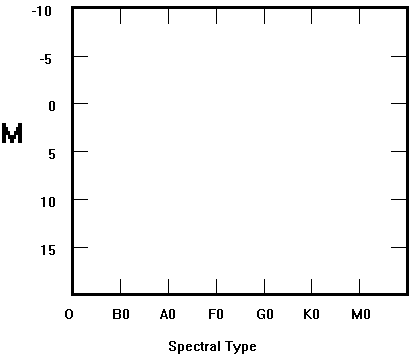1. Page 2 carries a list of stars together with their apparent magnitudes, distances, and temperatures. For each one calculate the absolute magnitude and enter it in the blank column labeled M. Use the formula:
![]() where d is the distance in parsecs.
where d is the distance in parsecs.
Example, Altair -- m=0.76, d=5.1pc
M=.76+5.-5.log(5.1)
M=5.76-5.x.707
M=2.2
2. Use interpolation from the following table to estimate the spectral type of each star. Enter type in column Sp of page 2. (If you don't know what interpolation means, look it up!)
Spectral Type Temperature (K)
O5
40,000
B0
28,000
B5
15,500
A0
9,900
A5
8,500
F0
7,400
F5
6,580
G0
6,030
G5
5,520
K0
4,900
K5
4,130
M0
3,480
M5
2,800
M8
2,400
3. Plot each star on the blank HR diagram provided on page 3. Using
a pencil sketch in the main sequence.
Or feel free to use some computer software to make your own plot.
4. Return to the table on page 2 and fill in the last column. Classify
each star as main sequence (M), giant (G), or white dwarf (W).
5. Use the fact that the Sun has an absolute magnitude of 4.5 and a luminosity of 4x1033ergs/s to scale to other stars. Use the Stefan-Boltzmann Law to calculate the radius of Sirius A, Sirius B, and Antares.
Star m d (pc) T (K) M Sp Type (MGW)
Altair
.76
5.1
8100
h Cas A
3.45 5.9
6030
h Cas B
7.51 5.9
3480
t
Ceti
3.50
3.6
5120
UV Ceti
12.95 2.7
2700
e Eridani
3.7 3.3
4600
g Cygni
2.2 250
6250
40 Eridani
4.4 4.9
4700
Sirius A
-1.46 2.7
9600
Sirius B
8.7 2.7
27000
Procyon A
0.37 3.5
6580
Procyon B
10.7 3.5
7000
YZ Canis Minoris 11.2
6.1 2950
g
Andromedae
2.1
75
4430
L145-141
11.4 5.0
15000
Wolf 359
13.5 2.3
2400
Proxima Centauri 11.0
1.3 2800
a Centauri A
0.0 1.3
5800
a Centauri B
1.33 1.3
4130
d Pavonis
3.55 5.7
5400
61 Cygni A
5.2 3.4
4100
61 Cygni B
6.0 3.4
3850
b Persei
2.2 32
12500
Antares
1.0 130
3400
Regulus
1.35 26
13500
Spica
1.0
80
25000
z Ophiuci
2.6 190
30000
z Puppis
2.2 700
40000
